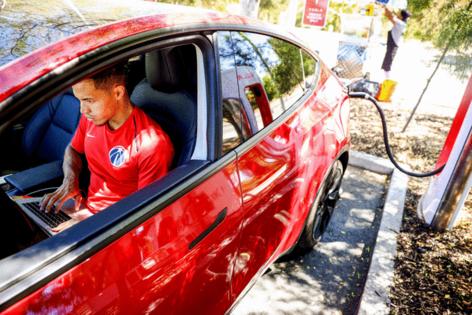Trump administration pledges to keep, streamline much-maligned EV charger program
Published in Business News
WASHINGTON — The Trump administration, months after signaling it might gut the effort completely, unveiled plans on Monday to expedite a Biden-era program focused on building public electric vehicle chargers nationwide.
The U.S. Department of Transportation said it would alter requirements in the $5 billion National Electric Vehicle Infrastructure Formula Program, or NEVI, to provide more flexibility to states and "slash red tape" left by the previous administration.
“The Biden-Buttigieg Administration failed to deliver EV chargers despite their promises. Our revised NEVI guidance slashes red tape and makes it easier for states to efficiently build out this infrastructure," said Transportation Sec. Sean Duffy, referring to his predecessor Pete Buttigieg. "While I don’t agree with subsidizing green energy, we will respect Congress' will and make sure this program uses federal resources efficiently.”
The move is a surprising reversal following months of work by President Donald Trump and his allies to roll back pro-EV initiatives in the federal government. Now, instead of nixing NEVI, the Trump administration has pledged to improve a program that became a bipartisan symbol of sluggish bureaucracy under the Biden administration.
"If Congress is requiring the federal government to support charging stations, let’s cut the waste and do it right,” Duffy added.
NEVI was part of the Bipartisan Infrastructure Law signed by Democratic President Joe Biden in November 2021. It offered an infusion of $5 billion to states to build out their charger networks as electric vehicles become more common, with Michigan getting $110 million through fiscal year 2026. The law also included a separate $2.5 billion grant program issued on a discretionary basis to cities, rural areas and major transportation corridors.
Republican and Democratic lawmakers alike criticized the program after it produced only a handful of completed, functional charger stations within the first three years of the program. "That’s pathetic," U.S. Sen. Jeff Merkley, D-Ore., said in a May 2024 hearing. "That is a vast administrative failure.”
A recent update showed progress. The federal programs yielded 384 charging ports by April 2025, according to a recent Government Accountability Office report. But even as projects and investments started to yield more results, the Trump administration fought for months to put — and keep — the program on hold.
Trump, in an executive order signed the day he returned to office, called out NEVI in a section on "Terminating the Green New Deal." His Department of Transportation then suspended the program in February, though the agency noted a goal of providing updated guidance later in the year.
NEVI had about $2.7 billion remaining in unobligated funds at the time, according to the Federal Highway Administration.
The GAO, a nonpartisan agency within Congress, issued an opinion in May finding that the Trump administration was breaking the law by withholding charger funds. The opinion was not binding, but it served as an important signal that federal courts might reach a similar conclusion and force the DOT to resume the program, according to the nonpartisan Eno Center for Transportation.
The White House's Office of Management and Budget then instructed the DOT to disregard the opinion and continue its suspension of the NEVI program. But the Trump administration now appears to be ending its NEVI fight, instead vowing to make it easier for states to address a lag in public charging infrastructure that has slowed EV adoption in the United States.
The Transportation Department said Monday it would minimize onerous requirements and simplify the federal approval process for state plans. For example, the new guidance removes an order for states to ensure "the deployment, installation, operation, and use of EV charging infrastructure achieves equitable and fair distribution of benefits and services."
The new guidance also removes a requirement for states to explain how their NEVI implementation would encourage participation from small businesses, including minority-owned and women-owned small businesses. The guidance also minimizes requirements for states to consider "electric grid integration and renewable energy."
States will be required to submit new plans to the Department of Transportation within 30 days.
©2025 www.detroitnews.com. Visit at detroitnews.com. Distributed by Tribune Content Agency, LLC.












Comments